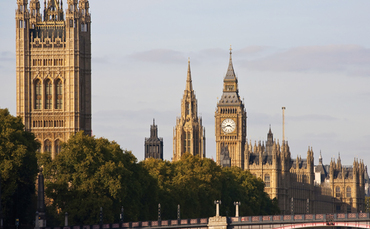Businesses, campaigners, and the government’s own watchdog unite against ‘bonfire’ of EU law

Serious concerns are mounting about the government’s rush to ditch or amend hundreds of EU-derived laws by the end of next year, with both leading business groups and the UK’s green watchdog urging Ministers to rethink their approach amid fears the proposed legislative bonfire poses risks to both the environment and the economy.
The controversial Retained EU Law (Revocation and Reform) Bill – a move originally championed by Jacob Rees-Mogg during his brief stint as business secretary – is designed to strike remaining EU laws from the statute books by the end of 2023.
The bill is currently going through the committee stage in Parliament, despite hopes in some quarters that the ousting of Liz Truss as Prime Minister could prompt the new government to rethink the controversial legislation.
The bill was first announced in September shortly after Truss became PM, angering environmental groups who have repeatedly warned rushing to sunset EU-derived legislation could impact as many as 570 retained laws that come under the remit of Defra.
Invesco strengthens ESG criteria for corporate bond and emerging markets ETFs
Campaigners warned that simply axing environmental laws from the statute books without replacement legislation in place could leave huge holes in the UK’s legal framework and seriously undermine the government’s overarching goals to deliver net zero emissions and reverse the loss of nature.
And today more than a dozen organisations – including the Institute of Directors, the Trades Union Congress, the National Farmers Union, Which?, the British Safety Council, Greener UK, and the Wildlife and Countryside Link – have written to the government warning the legislation risks imposing a major new administrative burden on business while also endangering critical worker, consumer, and environmental protections.
The Bill has become a cause celebre for arch-Brexiteers within the Conservative Party, who are keen to see the government bring an end to any EU influence over UK laws as quickly as possible. They have argued that ditching EU laws would allow the UK to bring in its own legislation in areas such as working hours and environmental protection that would help to drive economic growth.
But the groups warn in today’s letter that rushing to ditch so many laws in one swoop could leave businesses facing further policy uncertainty as they also wrestle with soaring energy costs and a looming recession, according to the FT. Trade experts have also warned that any attempt to tear up EU-derived rules that Brussels deems to result in unfair competition could spark retaliatory action.
A Fresh Take: Social mobility in asset management
TUC general secretary Frances O’Grady described the Bill as “a recipe for chaos”, as she called for it to be withdrawn “before lasting damage is done”, the FT reported this morning.
“This bill has been rushed through with no consultation and no real thought for the impacts on workers, businesses, consumers and the environment,” she said.
Civil servants also harbour deep concerns about the bill, it seems, with Bloomberg reporting that several senior civil servants have requested Ministers delay the timescales for the legislation by at least three years until 2026, arguing the current end of 2023 deadline will be hugely challenging to meet and require staff to work on reviewing EU-derived legislation full time.
Meanwhile, the UK’s environmental watchdog has this week separately warned the government is putting the protection and improvement of the environment at risk by rushing through the plans to ditch EU-derived laws.
The Office for Environmental Protection (OEP) said the end of 2023 deadline proposed for the review of retained EU laws constituted a rushed approach to law-making that could undermine the government’s environmental commitments.
The OEP has written to the Parliametary committee currently reviewing the bill to set out its concerns that it could lead to hundreds of critical environmental laws being revoked or amended.
ESMA to introduce rules on ESG fund names to tackle greenwashing
“These laws are critical to solving pressing challenges such as nature depletion and the quality of air and water and marine environments,” said OEP chair Dame Glenys Stacey. “Worryingly, the Bill does not offer any safety net, there is no requirement to maintain existing levels of environmental protection.”
Stacey acknowledged the review of EU laws planned by the government could offer an opportunity to improve legislation, but she warned its rushed approach to complete the process by the end of 2023 posed huge risks to environmental protection in the UK. “If done well, this review could make environmental law better, but done badly, or rushed unduly, it could compound environmental problems and create new uncertainties and burdens,” she said.
“Rushed law-making is not conducive to addressing environmental problems that are difficult, complex, inter-connected and long-term. It runs the risk of undermining the UK government’s own environmental ambitions and international standing.”
The OEP set out four recommendations to the legislative committee yesterday, but stopped short of calling for the Bill to be withdrawn altogether.
It argued the 2023 sunset date for EU legislation set out in the bill should be extended alongside a clear implementation plan for how the body of law can be properly reviewed within set timescales.
It also said governments should produce a “comprehensive list” of the environmental EU laws that fall under the scope of the Bill as soon as possible, and provide evidence for any proposed change or revocation of green laws.
Moreover, in order to reduce the risk of crucial legislation being scrapped, it said an environmental non-regression safeguard should be added to the bill “as a minimum measure”, backed by a clear explanation of the process the UK and devolved governments intend to follow in implementing the bill.
However, concerns over the bill, coupled with Defra’s recent failure to meet a deadline to set new environmental protection targets, are likely to place the spotlight on the UK’s commitment to nature protection just as it gears up to meet with global governments at the UN Biodiversity Summit in Montreal in several weeks’ time.
Many hopes are pinned on the COP15 Summit delivering an historic global treaty to halt and reverse nature loss by 2030 – akin to a Paris Agreement for the natural world.
ESG managers: Poor data dogs strong investor demand
And this week, the UK’s six nature conservation agencies for England, Wales, Scotland, and Northern Ireland set out their collective plan to boost nature recovery both at home and abroad ahead of the upcoming Summit.
In a joint statement, the agencies argued more efforts were needed to align action to reverse biodiversity loss and tackle climate change, and argued the economy would not be able to thrive without more effective and ambitious environmental protections.
The agencies – which include the Joint Nature Conservation Committee, Natural England, Natural Resources Wales, NatureScot, and Northern Ireland’s Council for Nature and the Countryside and DAERA – held an event this week to pledge their support for an ambitious COP15 outcome.
They promised to support ambitious global targets to enhance biodiversity at COP15, boost investment in nature-based solutions, embed environmental security and nature recovery into all decision making, and deliver on the UK government’s policies to protect and enhance nature.
“We will support the UK governments to bring countries together and agree an ambitious plan for the recovery of the natural world backed by strong targets for 2030, making this a ‘Paris moment’ for Nature,” said Natural England chair Tony Juniper. “The meeting has the chance to significantly increase the mobilisation of resources to implement such a plan. We know from numerous examples of nature recovery that we have helped deliver that this will be money well spent, and certainly cheaper than dealing with the consequences of not taking action.”
The government was considering a request for comment on criticisms of its plan to rush through the bonfire of EU law at the time of going to press.
However, the government’s minister for international nature Lord Benyon this week stressed the importance of protecting the natural environment, as he set out his hopes for an ambitious biodiversity treaty at COP15 in Montreal next month.
“A healthy natural environment is the cornerstone of a healthy climate, secure and clean water supplies and a resilient food supply,” he said. “Only by working collaboratively together, sharing knowledge and arguing for high ambition we will achieve a set of robust commitments in Montreal which restore the natural world and tackle the twin challenges of nature loss and climate change.”
So many policies associated with the short-lived Truss-era on Downing Street have already been unpicked or ditched under Rishi Sunak, and as the world’s attention turns to delivering a strong global treaty for nature protection in Montreal in a few week’s time, campaigners will be hoping the tide is also turning against Brexiteers’ hopes of throwing EU-derived environmental legislation onto the bonfire.
With green groups, businesses and the government’s own advisers united against the EU Retained Law Bill, the government faces a challenge to deliver the bill without significant revisions. But at the same time, Sunak will know that any attempt to dilute or delay the bill will prompt howls of outrage from those colleagues who always regarded the axing of environmental protections as a key plank of the Brexit project.
World News || Latest News || U.S. News
Source link



